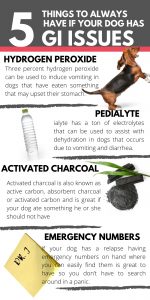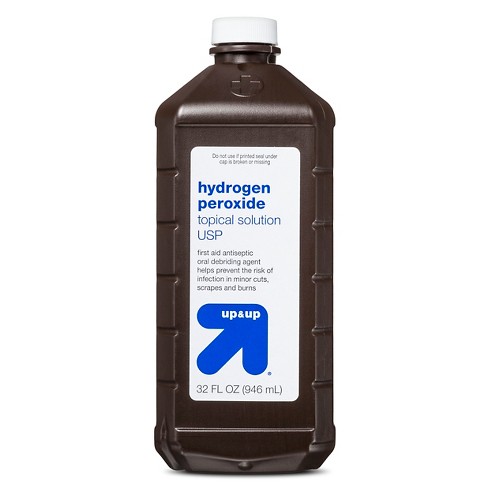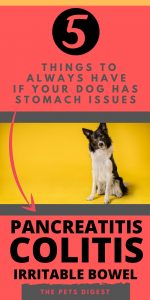Feeding your dog a bland diet and low-fat treats is par for the course if you have a dog with chronic pancreatitis or other chronic intestinal diseases.
While I try to be careful with what my little guy is fed he is always finding a way to get into something he shouldn’t eat! While I try to add some variety to his diet by making low-fat treats (check out some on the website), he constantly tries to seek out other foods to eat.
Due to this fact here are some things that I find pretty important to have on hand at all times.

1. Activated Charcoal

Activated charcoal is also known as active carbon, absorbent charcoal, or activated carbon. Many times I would add this to a dog’s treatments that came into the clinic for pancreatitis. It is used for detoxification and absorption of toxins in the intestines. It’s actually pretty good at absorbing many toxins, but this depends on the type of toxin and time administered.
Activated charcoal is best administered within the first 30 minutes of toxicity exposure. Often times if given within this window it can greatly reduce the concentration of toxins. However, it shouldn’t be given with all toxins and a vet should be consulted prior to administration. If your dog is vomiting it may not be extremely effective.
It’s available in powdered form, tablets, or granules and mine is from the local drug store.
2. Hydrogen Peroxide

Three percent hydrogen peroxide can be used to induce vomiting in dogs that have eaten something that may upset their stomach. This is to get the toxins out of their systems quickly.
While it isn’t something that you want to do often or without first discussing using it with a licensed veterinarian it can be extremely effective if given within the appropriate window.
3. Unflavored Pedialyte
Pedialyte has a ton of electrolytes that can be used to assist with dehydration in dogs that occurs due to vomiting and diarrhea.
Adding a small amount to dogs that have lost a lot of fluids because of vomiting and diarrhea can prove to be quite beneficial. If you are going to use it to replenish electrolytes make sure you consult with your vet first to get a proper dose. Also ensure it does not contain sugar supplements like xylitol which can be fatal, read more about the effects of xylitol and other foods here.
4. Emergency Numbers
If your dog has a relapse having emergency numbers on hand where you can easily find them is great to have so you don’t have to search around in a panic.
5. Pet Insurance
While pet insurance is something you want to get prior to your dog’s diagnosis, if you had the wherewithal to purchase it, it can mean the difference between not being able to afford care and getting your dog treated.
Ask family and friends if they have pet insurance for their dogs also look through reviews. I have insurance for my dogs and since I no longer practice medicine full time it comes in handy for many things including vaccinations.


























































































































